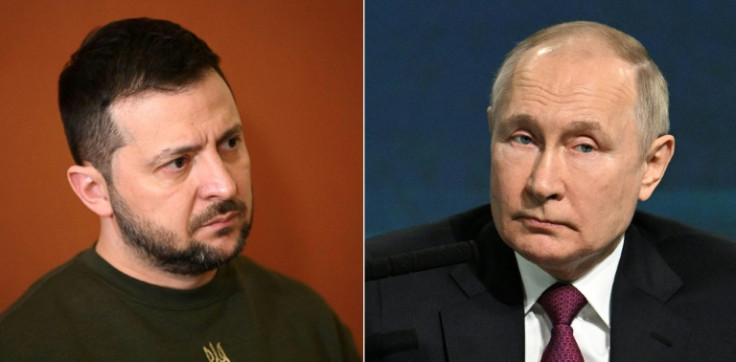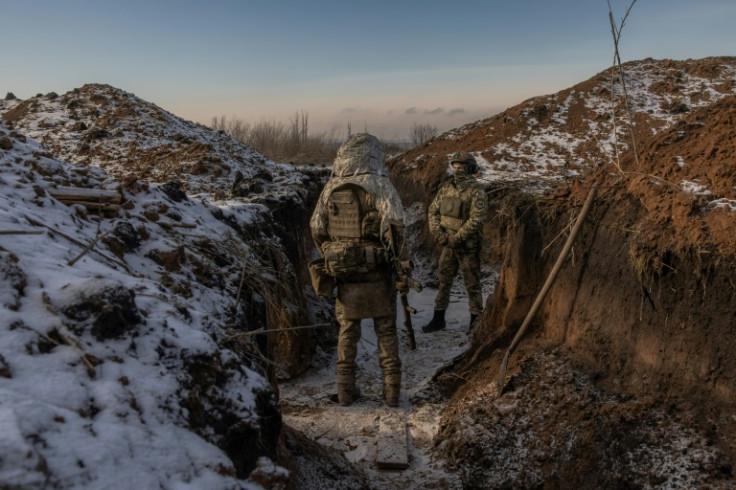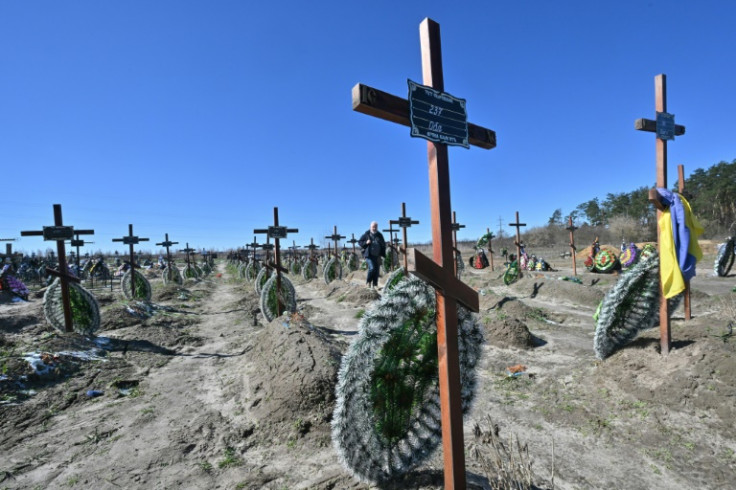Battleground Ukraine: 10 Years Of Russian Aggression

Ukraine has been locked in an existential fight for its freedom ever since Russia sent armed soldiers with no insignia -- dubbed the "little green men" -- to take over the Crimea peninsula on February 28, 2014, following a pro-EU revolution in Kyiv.
The annexation of Crimea marked the beginning of a decade of Russian aggression against its former Soviet neighbour.
AFP looks back at key moments in the fight for Ukraine:
In March 2014, after weeks of mass protests, Ukrainians overthrow their Kremlin-backed leader Viktor Yanukovych for reneging on a deal to develop closer ties with the European Union.
Russia retaliates by seizing Ukraine's Crimea peninsula.
The following month, pro-Russian separatists in the eastern region of Donbas, on the border with Russia, take up arms against Kyiv.
Ukraine and the West accuse Russia of supplying the separatists with arms, troops and military advisors, which Moscow initially denies.
On July 17, 2014, Malaysia Airlines flight MH17 is shot down over rebel-held Ukrainian territory by a Russian-made missile, killing all 298 people on board, mostly Dutch nationals.
A first ceasefire deal in September 2014 collapses within days.
A second agreement, negotiated in February 2015 in the Belarus capital Minsk by the leaders of Ukraine, Russia, France and Germany, proves more effective.
The fighting subsides but sporadic clashes continue in frontline areas.
In May 2019, TV comedian Volodymyr Zelensky becomes president.
He makes ending the war, which has left around 14,000 dead on both sides, his priority and holds talks with Russian President Vladimir Putin in Paris.
A new ceasefire in July 2020 ushers in several months of relative calm.
In 2021, fighting in eastern Ukraine intensifies again.
Invasion jitters set in after Putin pens a 7,000-word essay in July entitled "On the historical unity of Russians and Ukrainians".
Fears reach fever pitch in December, when Russia starts large-scale land, air and naval war games on Ukraine's eastern, northern and southern borders, massing 150,000 troops, according to Western estimates.
Moscow denies any plans to attack Ukraine.
At dawn on February 24, 2022, Ukraine's fears are realised when Putin announces a "special military operation" to demilitarise and "de-Nazify" Ukraine.
Missiles begin raining down on Ukrainian cities and Russian tanks rumble across the border.
A defiant Zelensky stays in Kyiv to lead the resistance.
Russian forces make early gains in the south, seizing the Black Sea port of Kherson, near Crimea.
But their expectations of a quick victory quickly fizzle in the face of fierce resistance around Kyiv and Ukraine's second city of Kharkiv in the northeast.
After a month, Russia is forced to retreat from the north to focus on the south coast and the Donbas region, partly held by separatists since 2014.
As they withdraw from Kyiv's suburbs, the Russians leave behind scenes of horror.
In early April, AFP discovers the bodies of at least 20 civilians on a street in the previously Russian-occupied city of Bucha, near Kyiv.
It is the first of several grisly discoveries that draw the world's attention to alleged Russian war crimes.
After a brutal three-month siege, Moscow announces the fall of the ruined southeastern port city of Mariupol.
A bitter battle begins in the summer of 2022 for the eastern town of Bakhmut, led on the Russian side by the Wagner mercenary group.
Putin annexes the eastern regions of Lugansk, Donetsk, Kherson and Zaporizhzhia, without controlling them entirely.
Ukrainian forces manage to win back Kherson city in November 2022.
Russia emerges the winner of the longest and bloodiest battle of the war to date when it conquers Bakhmut in May 2023.
In early 2023, Ukraine begins stockpiling more powerful weapons for a major counter-offensive.
Germany agrees to Zelensky's pleas for top-of-the-line Leopard tanks and the US sends powerful HIMARS mobile artillery systems and other weapons.
In June, Ukraine launches its long-awaited fightback.
But as the months pass, the sprawling 1,000-kilometre (620-mile) front line barely budges.
Support for Ukraine's war effort begins to fray in the United States and there is friction among European Union members.
On the eve of the war's second anniversary in February 2024, Russian forces claim their biggest victory since Bakhmut. They seize the eastern town of Avdiivka, which was also the object of a protracted, scorched-earth battle.


© Copyright AFP 2024. All rights reserved.











